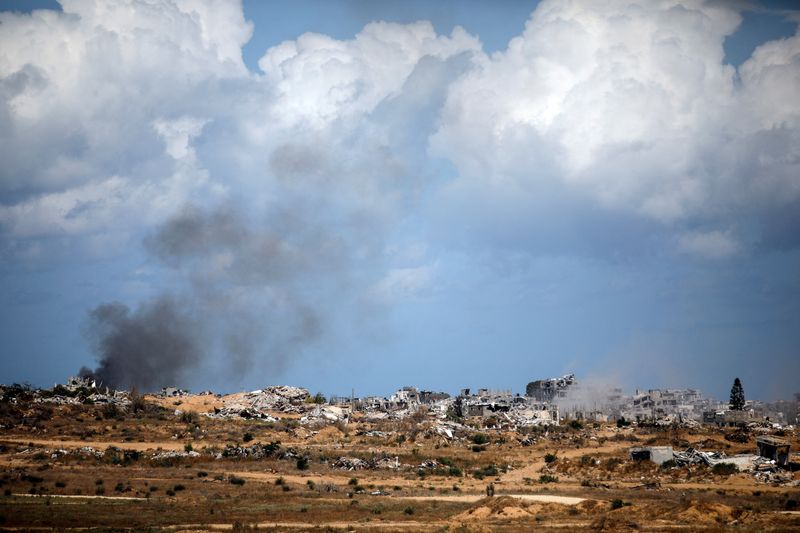By Nidal al-Mughrabi
CAIRO (Reuters) - Israeli forces battled Hamas-led militants in the northern and southern Gaza Strip on Thursday, and Palestinian health officials said Israeli military strikes across the enclave had killed at least 17 Palestinians overnight.
Medics said the deaths resulted from separate Israeli air strikes in Deir Al-Balah in the central Gaza Strip and in Khan Younis and Rafah in the south.
The armed wings of Hamas and the Islamic Jihad said fighters had attacked Israeli forces in the central Gaza Strip area with several mortar bombs. Hamas said its fighters also fired mortar bombs against Israeli forces in Khan Younis.
Residents said Israeli forces operating in Rafah and Zeitoun, a suburb of Gaza City, had blown up several homes in both areas as the military continued its operations there.
Gaza health authorities list more than 41,400 Palestinians confirmed killed in the assault, which Israel launched after Hamas fighters attacked Israeli towns on Oct. 7 last year, killing 1,200 people and capturing around 250 hostages.
War in Gaza has not let up, even as Israel's battle against Hezbollah in Lebanon has escalated. Many months of diplomatic efforts to reach a Gaza ceasefire have yielded little progress, with Israel refusing any deal to halt the fighting without the total defeat of Hamas.
In recent days the conflict has spread to another major theatre, with Israel launching the biggest airstrikes on Lebanon in nearly two decades, targeting Iran-backed Hezbollah, which has been firing into Israel in solidarity with the Palestinians.
On Wednesday, the United States, France and several other allies called for an immediate 21-day ceasefire across the Israel-Lebanon border while also expressing support for a Gaza ceasefire following intense discussions at the United Nations.
PEACE HOPES
In Gaza, many Palestinians voiced hope that a deal to end the war in Lebanon would also bring an end to the fighting in the Palestinian enclave.
"Since Oct. 8, Hassan Nasrallah conditioned ending the strikes by Hezbollah on ending the Israeli crimes and war on Gaza. This is a big gate of hope that peace may prevail in Lebanon and Gaza," said Tamer Al-Burai, a Palestinian businessman from Gaza City, who is currently displaced in Khan Younis in southern Gaza.
"We stand in solidarity with the people of Lebanon and we don't wish that anyone be harmed as Gaza was," Burai told Reuters via a chat app.
Nasrallah is the leader of Iran-backed Hezbollah.
Some expressed concern that a deal in Lebanon alone could free Israel's hands further in Gaza, but Abed Abu Mustafa, a resident of Gaza City, said he expected Nasrallah to continue supporting the Palestinian enclave.

"We are confident that Nasrallah wouldn't agree to a deal that doesn't include Gaza, he spoke several times about the unity of the axes of resistance," Mustafa, 48, told Reuters.
The 'Axis of Resistance' refers to groups including Hezbollah that are backed by Iran and have been waging attacks on Israel since war erupted between their ally Hamas and Israel on Oct. 7.
(Reporting and writing by Nidal al-Mughrabi; Editing by Gareth Jones)